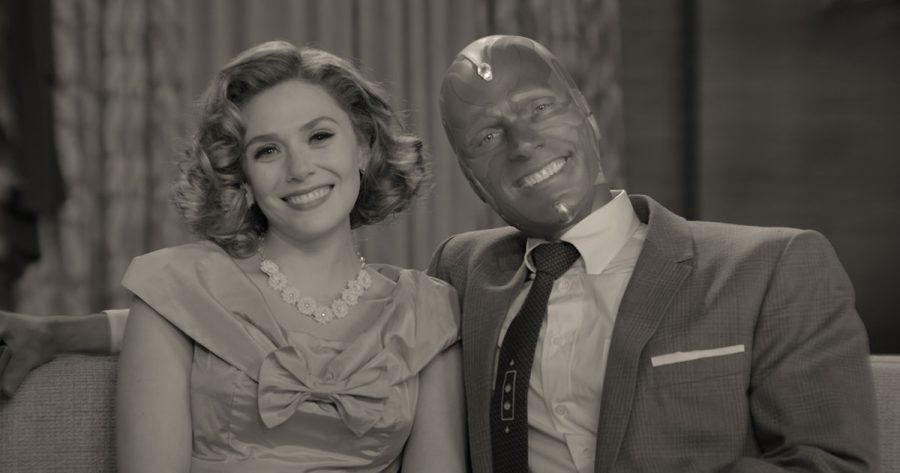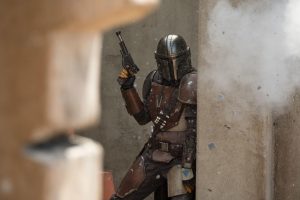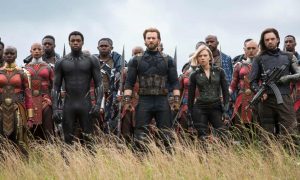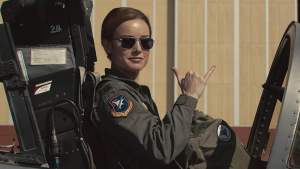DUO REVIEW: ‘WandaVision’ is wickedly entertaining, but ultimately underwhelming
No more, ‘Please Stand By’
Elizabeth Olsen and Paul Bettany play Wanda Maximoff and Vision respectively in the new Disney+ series, “WandaVision.” The show replaced “Black Widow” in being the first installment of the Marvel Cinematic Universe’s Phase Four after the pandemic delayed its May 2020 release. Photo courtesy of Marvel Studios. ©Marvel Studios 2021. All Rights Reserved.
March 6, 2021
These reviews contain spoilers for the series and season finale of “WandaVision.”
Opinion writers Bradley Hinkson and Estefany Nuñez have joined together to write their own reviews of the popular Marvel series, “WandaVision” exclusively on Disney+. Bradley’s perspective comes from a more critical standpoint and as someone who has grown more exhausted with the MCU with its feeling of sameness, while Estefany reviews the comic book storylines that play out in “WandaVision” and the easter eggs for MCU’s Phase Four.
Story continues after video.
Bradley’s review
“WandaVision” had the opportunity for the Marvel Cinematic Universe to truly branch out. No longer confined to the structure of contemporary Hollywood blockbuster filmmaking, the show had the chance to give audiences something refreshing. For the first three episodes, we do get that. It starts as a loving sitcom homage with a superhero twist and a fun slight mystery — until the show leaves the town of Westview.
Episode four is where the show starts to show its true colors unfortunately. “We Interrupt This Program” is so over expository and just feels like a way to rush into answers so the audience doesn’t lose interest. That uniqueness gets lost in the universe set up of later episodes. The playful and comedic dialogue of the sitcom gets bogged down by uninteresting expository dialogue. What’s the point of having a whole scene explaining Wanda’s backstory for an audience that more than likely knows who she is? There’s this lack of trust in the audience. I’ve got to give them some credit for not trying to cram in as much action as they can, but it feels too determined to get to answers quickly.
RELATED: REVIEW: ‘The Mandalorian’ is an instant cult classic for ‘Star Wars’ veterans
Episode eight benefits from trying to keep it all about Wanda’s trauma and grief. Elizabeth Olsen sells it completely, but a lot of it is brought down by the script. It is just too on the nose in stating its themes. The line “What is grief but love preserving” is nice enough, but also feels too much like the show is just stating what it’s about.
There’s a really interesting idea of how we connect to media in dealing with our grief that gets lost in the over complicated Marvel universe setup of it all. If the show spent more time developing this theme and not just throwing it into one episode, it would have not only been more effective, but it would have brought some much needed depth the MCU needs. It’s a fine enough exploration that works slightly in the moment, but doesn’t leave that much of a lasting impact. Quite fitting for these films.
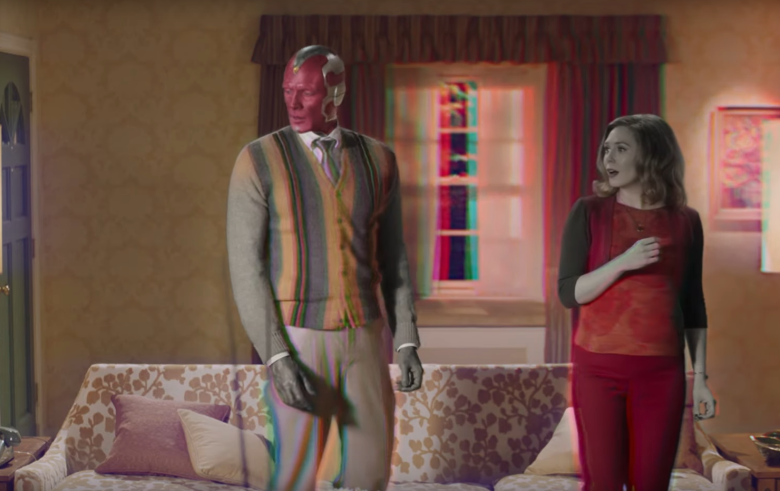
Then the finale comes along that shows that the series was less concerned about Wanda’s grief and more invested in how her powers will fulfill later installments. The driving emotional force of the series, Wanda not having anyone and needing some sort of happiness, is left abandoned by the end, and she is in the same position she was when the series started just with more powers than before. It’s not satisfying on an emotional or character level.
The show is definitely not devoid of any strengths or positives. The cast here is pretty terrific. I’ve mentioned Olsen’s strengths in the more dramatic moments, but she’s also a delight in the sitcom stuff. She nails the right mannerisms and inflections of old sitcom acting that never feels like she’s making a joke out of it, but does it as a loving homage. Paul Bettany, who plays Vision, also gets to do a lot more here than he’s ever been allowed in any of the MCU and you can tell he’s having a lot of fun with that freedom.
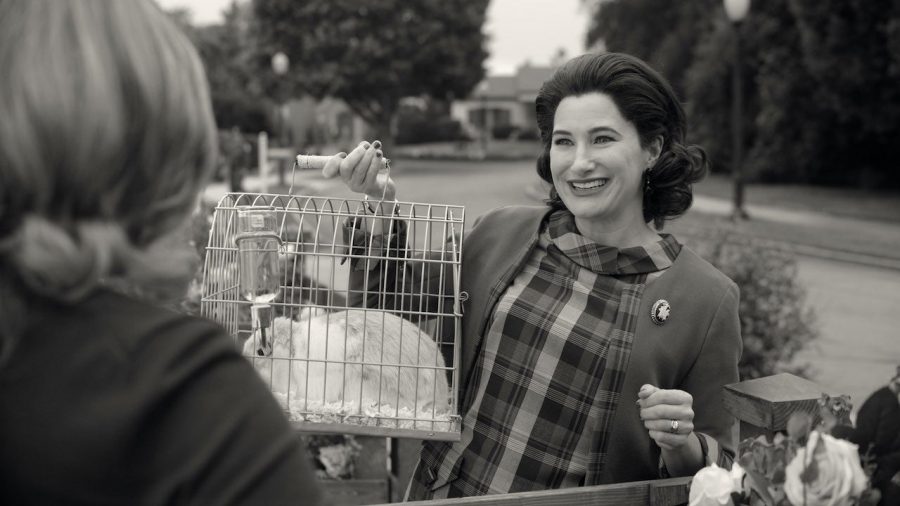
Though it’s Kathryn Hahn who’s the true highlight of the series. From the very second she’s on screen she steals the show with her dynamite energy and a further reminder of her great comedic talent. The promise of her as a fun villain was a joy to behold, but was suddenly destroyed when she spent the next episode just standing around stating the obvious — or being another bland villain by the finale throwing CGI magic orbs at Olsen. You had the chance and you blew it.
To me, the first two episodes are the strongest. It really goes for it to just make a pure classic sitcom occupied by Marvel characters. It never comes off as some cynical parody, but as a loving homage to the genre. Though shooting it in nice pristine HD slightly ruins the look. Also, the newly created theme songs for each decade are a delight.
Adding these characters into this environment is so much fun and you start to wonder how much stronger the show could be if it was more committed to doing this for a longer run. Even the strange moments that try to break from the upbeat sitcom style work to build this mystery that a stronger series would stretch out longer. This needed to be a few seasons.
There’s a really great show hiding in “WandaVision.” There’s some fun play with genre with an interesting take on grief that just unfortunately doesn’t fully come together as much as it should. It’s never a bore and is entertaining enough in parts, but there’s frustration to be had when it’s obvious the show has the potential to be more. Give me more sitcom shenanigans.
Theme Song Ranking
- Agatha All Along
- Wandavision!
- A Newlywed Couple
- Let’s Keep it Going
- We Got Something Cooking
- Making It Up As We Go Along
- W-V 2000
Estefany’s review
After going 563 days without a new installment from the Marvel Cinematic Universe, Marvel’s first Disney+ series “WandaVision” kicks off Phase Four strongly, but loses its charm as the show progresses.
Olsen’s quick versatility from her harmless neighbor persona to a threatening witch emphasizes the television show’s suspense as viewers wonder if Wanda is complicit in the false reality or in fact, the cause of it.
“WandaVision” crafted together a marvelous ode to sitcoms loaded with comic book influences that is delightful to watch both as a film studies student, and as a Marvel fan.
In episode two, Wanda turns her and Vision’s bedroom’s twin beds setup into a single shared bed with magic, which I thought was a humorous nod to how heterosexual couples often had to appear sexless in their bedroom during the Hollywood Hays Code. What a clever segue into conceiving the twin boys.
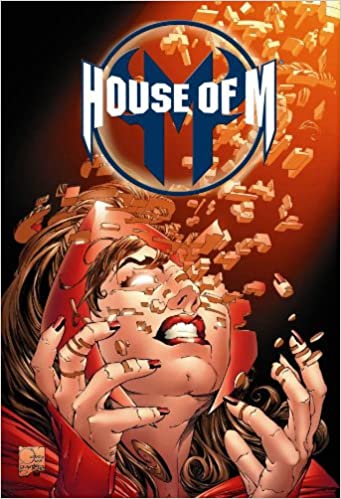
‘Speed’ and ‘Wiccan’ were bittersweet additions from the comics to the show. While I never expected “WandaVision” to completely follow the “Vision & the Scarlet Witch” and “House of M” storylines due to Marvel’s refusal to mention the word “mutant,” it was pleasing to see traces of the iconic cover art incorporated into the scene where Wanda involuntarily and subconsciously creates the Hex. It was less pleasant seeing the duo don their iconic costumes which have racist stereotypes of Romani and Mexican people for the sake of Halloween.
Director Matt Shakman utilizes different camera shots and angles when breaking the sitcom mold to tease the underlying impending doom coming Wanda’s way.
“WandaVision” switches from the sitcom’s 4:3 ratio to 21:9 throughout the series to mess with the audience’s sense of reality, as Wanda also is. For example, episode seven has a subtle aspect ratio change as Wanda walks into her nosy neighbor’s house only to reveal Agnes has been evil all along (Her broach being a comic book giveaway). It’s small details like these that otherwise made “WandaVision” enticing to watch.
Still, the show only confirmed what fans have known about Wanda Maximoff since her arrival in 2014’s “Avengers: Age of Ultron”: she’s the Scarlet Witch, capable of wielding chaos magic and manipulating probability.
Wanda’s refusal to escape her delusions and attempt to move on with a fragmented memory trapping a town’s population was stressed repeatedly throughout the show, but the conflict gets glazed over in the lazy ending.
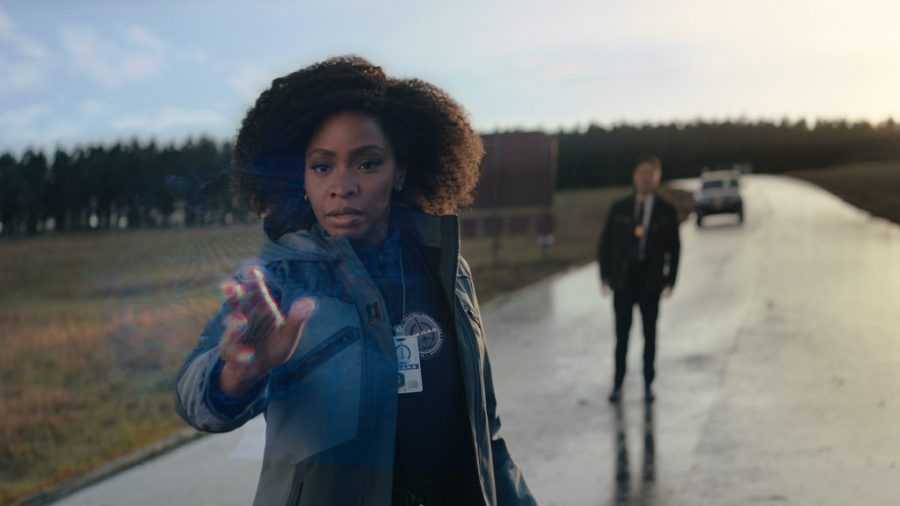
Having Teyonah Parris’ character, Monica Rambeau, become the first Black female superhero with powers in the show as a result of Wanda’s mutating magic was definitely exciting, but odd.
Rambeau’s screen presence often brought a much needed air of humanity and compassion, yet it became uncomfortable how often she became the show’s punching bag. Hopefully Parris gets the ability to shine as “Spectrum” in the upcoming “Captain Marvel” sequel being directed by Nia DaCosta.
RELATED: REVIEW: ‘Captain Marvel’ is the strongest Avenger, not the strongest movie
After all the red wiggly woos and the inevitable heartbreak in the season finale, the Scarlet Witch gets a uniform upgrade and has made herself vulnerable to the many dark forces that have also used the darkhold. The ‘Book of the Damned’ is an ancient tome full of sinister spells that originated from the Hell dimension, setting up Wanda’s role in the upcoming film “Doctor Strange and the Multiverse of Madness” being directed by Sam Raimi.
The obscure commercials depicting pivotal life moments in Wanda’s life also confirmed that Wanda is a nexus being. This means she’s a fixed point, a gateway, in the universe due to the massive amount of power she harbors, and is essential to the stability of the multiverse (Hence the rumors of Tobey Maguire and Andrew Garfield being in “Spider-Man: No Way Home”).
The way Marvel chose to dial back and have Wanda fulfill a prophet storyline feels overdone, and boring.
These Disney+ series are the first chance to actually go more in depth with these characters, but it seems to fall trap to its usual formula of teasing what’s forever to come.
What’s the point of Disney owning all these companies if they refuse to truly hit the ground running with the expansive universe they’re in possession of? There’s only so many more villains they can introduce and kill off in the same movie. If “WandaVision” is the type of ‘depth’ the shows will be exuding, I will continue to lower my expectations.
Now to wait two long weeks before the next installment of Phase Four begins on Mar. 19 with a six episode run, “The Falcon and the Winter Soldier.”


























































































































